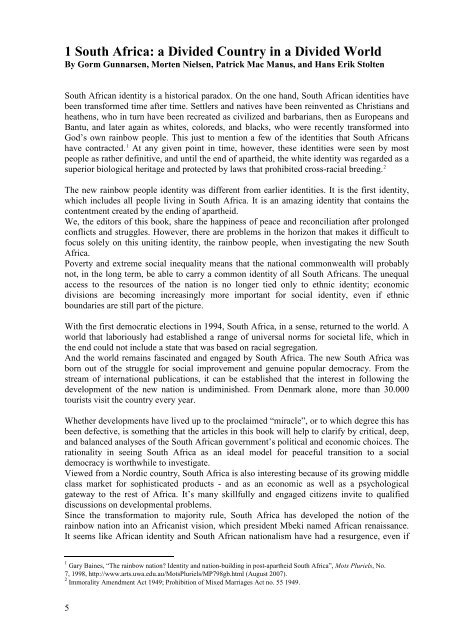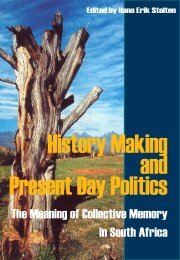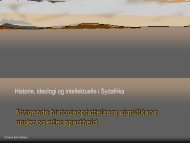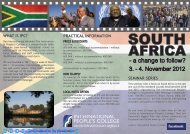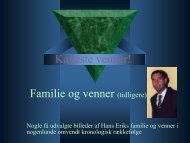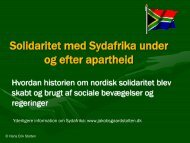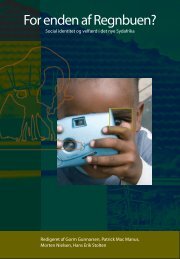At the end of the rainbow - Stolten's African Studies Resources
At the end of the rainbow - Stolten's African Studies Resources
At the end of the rainbow - Stolten's African Studies Resources
You also want an ePaper? Increase the reach of your titles
YUMPU automatically turns print PDFs into web optimized ePapers that Google loves.
1 South Africa: a Divided Country in a Divided World<br />
By Gorm Gunnarsen, Morten Nielsen, Patrick Mac Manus, and Hans Erik Stolten<br />
South <strong>African</strong> identity is a historical paradox. On <strong>the</strong> one hand, South <strong>African</strong> identities have<br />
been transformed time after time. Settlers and natives have been reinvented as Christians and<br />
hea<strong>the</strong>ns, who in turn have been recreated as civilized and barbarians, <strong>the</strong>n as Europeans and<br />
Bantu, and later again as whites, coloreds, and blacks, who were recently transformed into<br />
God’s own <strong>rainbow</strong> people. This just to mention a few <strong>of</strong> <strong>the</strong> identities that South <strong>African</strong>s<br />
have contracted. 1 <strong>At</strong> any given point in time, however, <strong>the</strong>se identities were seen by most<br />
people as ra<strong>the</strong>r definitive, and until <strong>the</strong> <strong>end</strong> <strong>of</strong> apar<strong>the</strong>id, <strong>the</strong> white identity was regarded as a<br />
superior biological heritage and protected by laws that prohibited cross-racial breeding. 2<br />
The new <strong>rainbow</strong> people identity was different from earlier identities. It is <strong>the</strong> first identity,<br />
which includes all people living in South Africa. It is an amazing identity that contains <strong>the</strong><br />
contentment created by <strong>the</strong> <strong>end</strong>ing <strong>of</strong> apar<strong>the</strong>id.<br />
We, <strong>the</strong> editors <strong>of</strong> this book, share <strong>the</strong> happiness <strong>of</strong> peace and reconciliation after prolonged<br />
conflicts and struggles. However, <strong>the</strong>re are problems in <strong>the</strong> horizon that makes it difficult to<br />
focus solely on this uniting identity, <strong>the</strong> <strong>rainbow</strong> people, when investigating <strong>the</strong> new South<br />
Africa.<br />
Poverty and extreme social inequality means that <strong>the</strong> national commonwealth will probably<br />
not, in <strong>the</strong> long term, be able to carry a common identity <strong>of</strong> all South <strong>African</strong>s. The unequal<br />
access to <strong>the</strong> resources <strong>of</strong> <strong>the</strong> nation is no longer tied only to ethnic identity; economic<br />
divisions are becoming increasingly more important for social identity, even if ethnic<br />
boundaries are still part <strong>of</strong> <strong>the</strong> picture.<br />
With <strong>the</strong> first democratic elections in 1994, South Africa, in a sense, returned to <strong>the</strong> world. A<br />
world that laboriously had established a range <strong>of</strong> universal norms for societal life, which in<br />
<strong>the</strong> <strong>end</strong> could not include a state that was based on racial segregation.<br />
And <strong>the</strong> world remains fascinated and engaged by South Africa. The new South Africa was<br />
born out <strong>of</strong> <strong>the</strong> struggle for social improvement and genuine popular democracy. From <strong>the</strong><br />
stream <strong>of</strong> international publications, it can be established that <strong>the</strong> interest in following <strong>the</strong><br />
development <strong>of</strong> <strong>the</strong> new nation is undiminished. From Denmark alone, more than 30.000<br />
tourists visit <strong>the</strong> country every year.<br />
Whe<strong>the</strong>r developments have lived up to <strong>the</strong> proclaimed “miracle”, or to which degree this has<br />
been defective, is something that <strong>the</strong> articles in this book will help to clarify by critical, deep,<br />
and balanced analyses <strong>of</strong> <strong>the</strong> South <strong>African</strong> government’s political and economic choices. The<br />
rationality in seeing South Africa as an ideal model for peaceful transition to a social<br />
democracy is worthwhile to investigate.<br />
Viewed from a Nordic country, South Africa is also interesting because <strong>of</strong> its growing middle<br />
class market for sophisticated products - and as an economic as well as a psychological<br />
gateway to <strong>the</strong> rest <strong>of</strong> Africa. It’s many skillfully and engaged citizens invite to qualified<br />
discussions on developmental problems.<br />
Since <strong>the</strong> transformation to majority rule, South Africa has developed <strong>the</strong> notion <strong>of</strong> <strong>the</strong><br />
<strong>rainbow</strong> nation into an <strong>African</strong>ist vision, which president Mbeki named <strong>African</strong> renaissance.<br />
It seems like <strong>African</strong> identity and South <strong>African</strong> nationalism have had a resurgence, even if<br />
1 Gary Baines, “The <strong>rainbow</strong> nation? Identity and nation-building in post-apar<strong>the</strong>id South Africa”, Mots Pluriels, No.<br />
7, 1998, http://www.arts.uwa.edu.au/MotsPluriels/MP798gb.html (August 2007).<br />
2 Immorality Am<strong>end</strong>ment Act 1949; Prohibition <strong>of</strong> Mixed Marriages Act no. 55 1949.<br />
5


